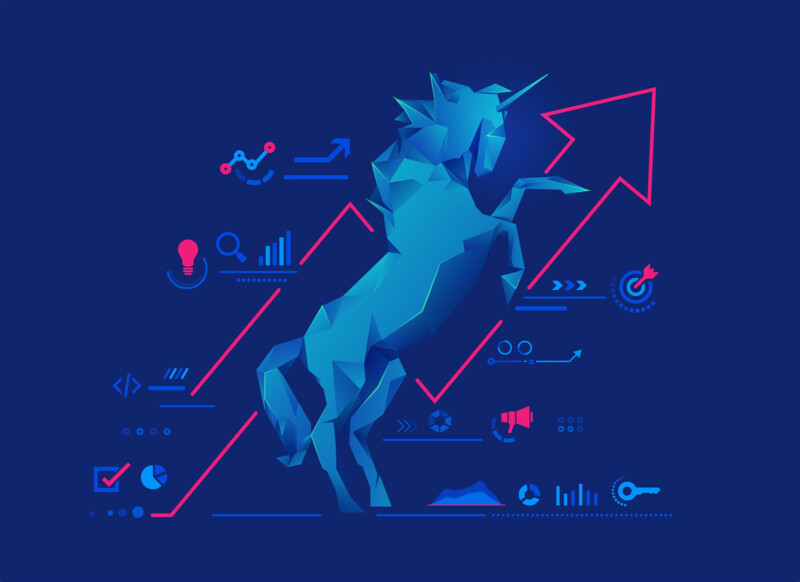Les startups européennes ont de plus en plus de poids, et l’on recense aujourd’hui sur le Vieux Continent pas moins de 283 licornes, ces startups dont la valorisation est supérieure à 1 milliard de dollars, et quelques centaures. Zoom sur ce changement de dimension.
Des licornes aux centaures
Dans le cadre du salon européen de la tech, VivaTech, qui accueille 1700 startups à Paris du 15 au 18 juin, GP Bullhound a publié son rapport annuel « Titans of Tech », qui fait le point sur le paysage européen des startups.
On compte désormais sur le Vieux Continent 283 licornes, ces startups valorisées à plus d’1 milliard de dollars, soit 10 fois plus qu’il y a 8 ans en 2014. Les décacornes européennes, valorisées à plus de 10 milliards de dollars, sont aujourd’hui au nombre de 37. Parmi elles, on peut mentionner la fintech suédoise Klarna ou l’allemande Celonis.
Depuis peu, les startups appelées « centaures » se multiplient également en Europe : le terme désigne les startups générant au moins 100 millions de dollars de revenus récurrents annuels (ARR).
Leur nombre précis reste incertain, puisqu’elles sont peu nombreuses à rendre leurs résultats financiers publics. On peut toutefois citer les licornes françaises Mirakl et EcoVadis, cette dernière s’apprêtant à franchir la barre des 100 millions de dollars d’ARR pour son exercice 2022.
EcoVadis obtient un financement de 500 millions de dollars, mené par Astorg, #BeyondNetZero et @generalatlantic, afin d'accélérer l’adoption de sa plateforme de notation RSE et contribuer à une économie mondiale plus responsable. Lisez la nouvelle ici ! https://t.co/8zwoWyTSol pic.twitter.com/RBDwhV2ykI
— EcoVadis France (@EcoVadisFR) June 14, 2022
Rentabilité, impact et parité
Le rapport annuel de GB Bullhound « Euroopean tech sector doubles in value during pandemic » liste d’autres indicateurs de la vitalité des startups européennes. Si l’un des critères les plus souvent retenus est le montant des levées de fonds, il n’est pourtant pas le plus pertinent pour évaluer la bonne santé financière d’une startup.
En effet, une croissance très rapide n’est pas forcément synonyme de rentabilité, et les investisseurs demandent désormais plus d’éléments de sécurité avant de s’engager. D’autant qu’à l’échelle mondiale, les levées de fonds sont en baisse, tant au niveau des montants réunis que du nombre d’opérations.
L’année dernière, certaines startups parvenaient encore à lever des millions de dollars sans présenter aucun produit ; aujourd’hui, les investisseurs exigent des preuves concrètes de leur rentabilité pour minimiser les risques.
Autre signe que les startups européennes jouent maintenant dans la cour des grands : leur engagement croissant en faveur des sujets d’impact, tant sur le plan social que sociétal ou environnemental. Le rapport « Titans of Tech » relève une augmentation de 50 % des offres d’emploi consacrées à l’impact dans le secteur de la tech entre 2020 et 2021.
Les jeunes pousses sont de plus en plus nombreuses à communiquer sur leur démarche RSE, mais aussi à s’engager en faveur de la parité. La mission French Tech a ainsi élaboré il y a quelques semaines un « pacte parité », signé à ce jour par 140 startups. Ce pacte parité prévoit notamment un quota de 20 % de femmes dans les conseils d’administration à l’horizon 2025, et de 40 % à l’horizon 2028.
Enfin, autre indicateur du changement de dimension des startups européennes : le développement des opérations de fusions-acquisitions, qui permettent aux jeunes pousses de grandir notamment en rachetant à moindre coût des entreprises en difficulté.
